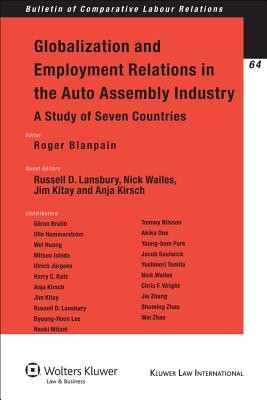
- We will send in 10–14 business days.
- Publisher: Kluwer Law International
- Year: 2008
- Pages: 152
- ISBN-10: 9041126988
- ISBN-13: 9789041126986
- Format: 15.8 x 23.9 x 1 cm, softcover
- Language: English
- SAVE -10% with code: EXTRA
Globalization and Employment Relations in the Auto Assembly Indutry (e-book) (used book) | bookbook.eu
Reviews
Description
This important study--based on a three-year empirical research project in seven countries--focuses on employment relations in the auto assembly industry and shows that the influence of globalisation is tempered to varying degrees by institutional employment patterns at the local level. Twenty-one scholars and researchers representing all seven countries analyse the data, clearly describe the differences across both countries and firms, and offer conclusions and recommendations that greatly facilitate our understanding of the globalisation process at the level of human resources in industrial production. For each of the seven countries--two liberal market economies (the United States and Australia), two coordinated market economies (Germany and Sweden), and three Asian market economies (Japan, South Korea, and China)--the book describes five key issues in detail: work organisation; skill formation; remuneration systems; staffing arrangements and employment security; and enterprise governance and employee-management relations. The authors offer in-depth comparative analysis of these central issues in the context of such overriding factors as corporate strategy, local institutional constraints and advantages, competitive pressures among automakers to capture emerging markets, power relations within firms, and the role that agency and interests play in shaping social action.
EXTRA 10 % discount with code: EXTRA
The promotion ends in 18d.06:48:59
The discount code is valid when purchasing from 10 €. Discounts do not stack.
- Publisher: Kluwer Law International
- Year: 2008
- Pages: 152
- ISBN-10: 9041126988
- ISBN-13: 9789041126986
- Format: 15.8 x 23.9 x 1 cm, softcover
- Language: English English
This important study--based on a three-year empirical research project in seven countries--focuses on employment relations in the auto assembly industry and shows that the influence of globalisation is tempered to varying degrees by institutional employment patterns at the local level. Twenty-one scholars and researchers representing all seven countries analyse the data, clearly describe the differences across both countries and firms, and offer conclusions and recommendations that greatly facilitate our understanding of the globalisation process at the level of human resources in industrial production. For each of the seven countries--two liberal market economies (the United States and Australia), two coordinated market economies (Germany and Sweden), and three Asian market economies (Japan, South Korea, and China)--the book describes five key issues in detail: work organisation; skill formation; remuneration systems; staffing arrangements and employment security; and enterprise governance and employee-management relations. The authors offer in-depth comparative analysis of these central issues in the context of such overriding factors as corporate strategy, local institutional constraints and advantages, competitive pressures among automakers to capture emerging markets, power relations within firms, and the role that agency and interests play in shaping social action.


Reviews